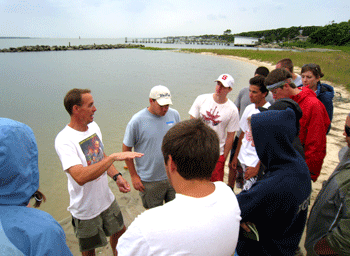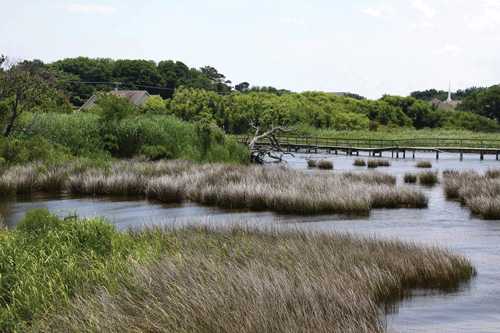Fisheries Ecology
The fisheries ecology group addresses the question, “What causes populations of fish to vary in size?” Increases in population size result from production of young fish, which we refer to as ‘recruitment’.
Overview
Decreases in population size can result from natural causes of death such as a bigger fish eating a smaller fish or rapid drops in water temperature; deaths from fishing also decrease fish population size.
To measure these ‘vital’ rates (recruitment and death), we use a variety of approaches such as sampling fish with nets, tagging fish with external marks, monitoring fish with electronic pingers, determining what fish eat, and modeling fish populations. We cooperate with commercial and recreational fishermen and other scientists in state and federal fisheries management agencies to ensure research success and relevance.
The program is made up of several faculty (Jeff Buckel, Jie Cao, and Nathan Hostetter) from the Department of Applied Ecology. Dr. Jeff Buckel, a resident faculty, conducts research to improve assessment and management of marine and estuarine fisheries. Another resident faculty, Dr. Jie Cao, is an expert in population dynamics and fishery stock assessment modeling.
Collaborators include the North Carolina Division of Marine Fisheries, NOAA’s Beaufort Laboratory, University of North Carolina at Wilmington, University of Massachusetts, SUNY Stony Brook, University of Maryland, and Rutgers University.

Additional Information

Some specific examples of work in NC include:
- Discard rates and fate of reef fish in Onslow Bay, North Carolina
- Estimation of fishing and natural mortality rates of red drum using a combined tag and telemetry approach
- Ecology of bluefin tuna feeding during winter and potential impacts on Atlantic menhaden
- Striped bass and river herring interactions in Albemarle Sound
- Winter survival of bluefish and recruitment implications
- Coastal recruitment indices for bluefish from New York to Florida
- Age and growth of dolphin fish in North Carolina
Dr. Jeff Buckel serves on NC Marine Fishery Commission advisory boards and the South Atlantic Fishery Management Council’s Science and Statistical Committee.
Research from the Marine and Estuarine Fisheries Ecology group has been used in state and federal fishery and habitat management plans. Additionally, personnel from the group give presentations to K-12 students, recreational fishing clubs, commercial fishing groups, and high school instructors.
Some specific examples in NC include:
- Pamphlet on ethical angling for grouper
- Data and analytical support for the red drum fishery stock assessment
- Data for the striped mullet fishery management plan
- Data for the spiny dogfish compliance advisory panel